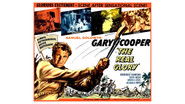jlthornb51
The great Henry Hathaway directed this stirring tribute to the American soldiers who fought the savagely crazed Moros in defense of the Filipino people. So insanely monstrous were these Moros that the .45 automatic handgun was developed to produce the stopping power to prevent these bloodthirsty murderers from wildly hacking innocent Americans to pieces. The Muslim Moros had to be subdued by military force in the early twentieth century and the terrible struggle by U.S. forces to bring these fanatics to their knees is not well remembered today. In this exciting film, Gary Cooper gives a fine performance as a brave trooper who risks everything duty demands to save the civilization America brought to the Philippines after the Spanish American war freed the people from Spain's inhuman oppression. As a new enemy threatens to destroy all that had been done for the Filipinos through U.S. sacrifices, America must once more rise to meet the terror that seeks to wipe out democracy in the name of an evil theocratic ideal. A stirring tribute to the heroes of what is known as the Philippine Insurrection and quite prescient as an early depiction of radical Islamic extremism. A first class production from what is considered the greatest year in the history of Hollywood, 1939. A sprawling historical epic that is sadly quite relevant to our own era and the ugly danger that is no longer contained in faraway places but threatens our very own soil. Regrettably, this film is not simply a curiosity regarding a vague bit of history but an important statement for Western civilization today.
marknyc
This film is typical of American films that present us as benevolent occupiers rather than the aggressive colonizers we were.Contrary to the film's assertion, Filipinos were not simple people who were happy to have Americans occupying their country. The bloody Philippine-American War, during which Filipinos fought for their independence, lasted for four years. Some Americans, including William Jennings Bryan, Mark Twain, and Andrew Carnegie, strongly objected to the annexation of the Philippines. The U.S. declared victory in 1902, but in the south, Muslim Filipinos resisted until 1913, and the Americans never acquired complete control over the Muslim areas of Mindanao.The word "moro" used in the film to refer to the Muslims is a pejorative term used by the non-Muslim (i.e., Christian) majority, and Muslims o that time would not call themselves "moro." While it is historically accurate that there were Muslims pirates that attacked coastal villages, this film represents most Muslims as "native devils" and the non-Muslim Filipinos s as frightened children who need brave Americans to teach them courage. The reality is that Muslim Filipinos refused to be subjugated by American rule and fought a drawn-ought guerrilla war, the first of its kind in modern history and the only kind possible when faced with the wealth and power of the U.S colonial machinery.When you are fighting against troops that are illegally occupying your country, is that a rebellion or is it self-defense? The current situation in Iraq shows that not much has changed over 100 years later.
JGAS
As interesting as the personal relationships were written - for the times, the action sequences were the most escapist - from the laws of probability.It was interesting to see the Moro leaders speak to each other in English then turn to their followers and speak to them in the native language. It was surprising to have Canavan view the Moro gang's ceremonial planning for the next act and not recognize the Moro chief, Datu, as one of the conspirators. It was astounding that when a speedy return to the fort was required, taking the time to build 10-15 rafts to float the squadron down the undammed river was the method of travel. It was magical to see that trees were cut and lashed together for the rafts without the appearance of tools or an area for construction.But it was just unbelievable to watch the men navigate the rushing river rapids standing on the rafts with push poles, then have only the native constabulary falling off the raft while Canavan stands statuesque as the raft plows into a giant rock in the middle of the river.These were all things that could have been accomplished correctly relatively easily.It was just funny to see the close-up scenes on the river that were clearly mixed images. But that's the best they could do then. It was also funny to see the cannon shots into the fort wall, unless the script was trying to say the attacking gang had somehow lifted the cannon over the wall and was firing from the outside. It makes David Niven's English accent while claiming an entire life in the US almost plausible.Escapist? Whew, I should say! But I guess it's the best they could do?
Alice Liddel
What appears to be an imperialist jungle army adventure along the lines of Gary Cooper's previous 'Lives of a Bengal Lancer' turns out to be a disaster movie. Like all disaster movies, we sit through an hour and a half of character japery, sinister plots and love interests before the climactic spectacular set-piece, an old-fashioned dam-busting that spurts a Wagnerian birth-rush, waking up the cholera-ridden locals. One could carp at the era's ideology - the well-rounded Americans; the infantilised Filipino locals; the sinister Fu Manchu villains. What are more interesting are the cracks - the violent vengefulness that grips David Niven's previously amiable character; the shocking murder of the commander in front of his wife and impotent peers; the blind intransigence of his replacement, Captain Hartley.



